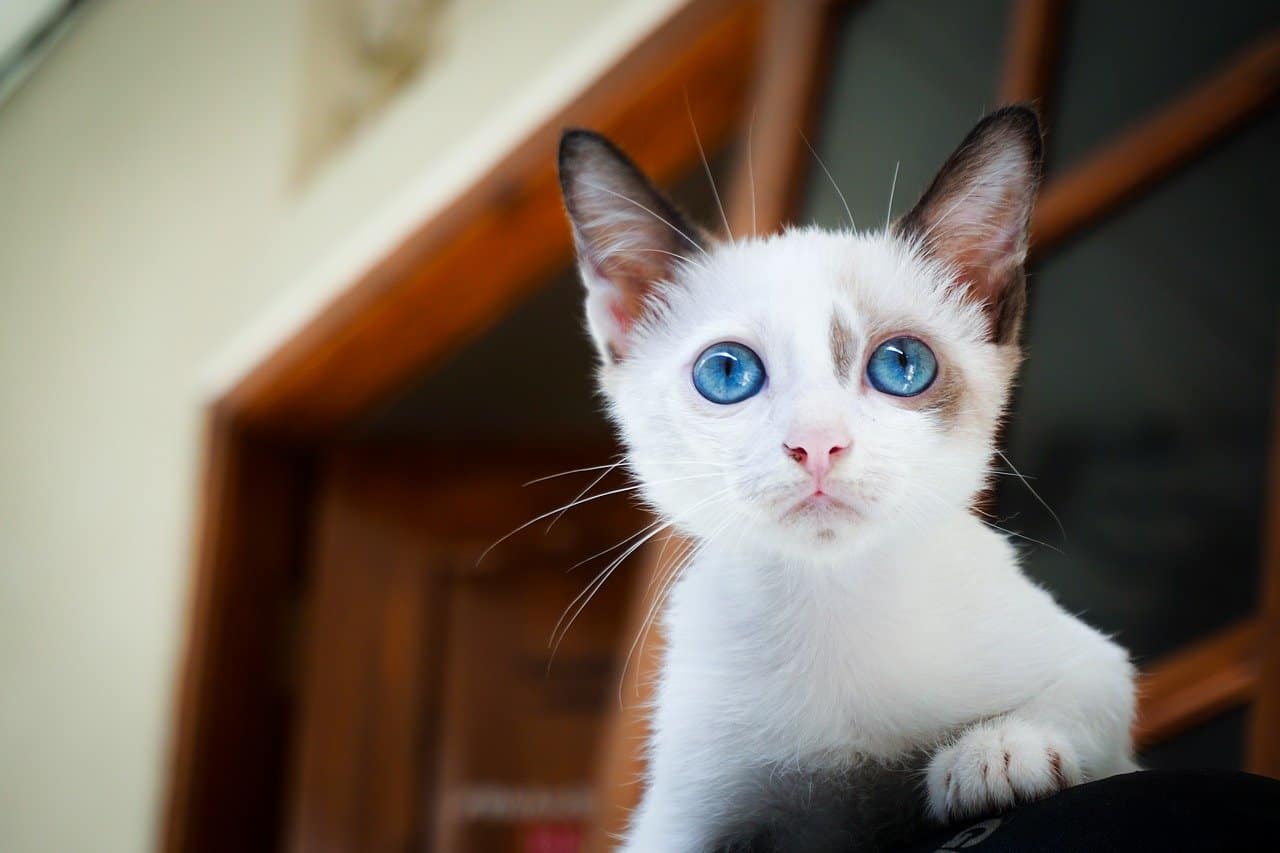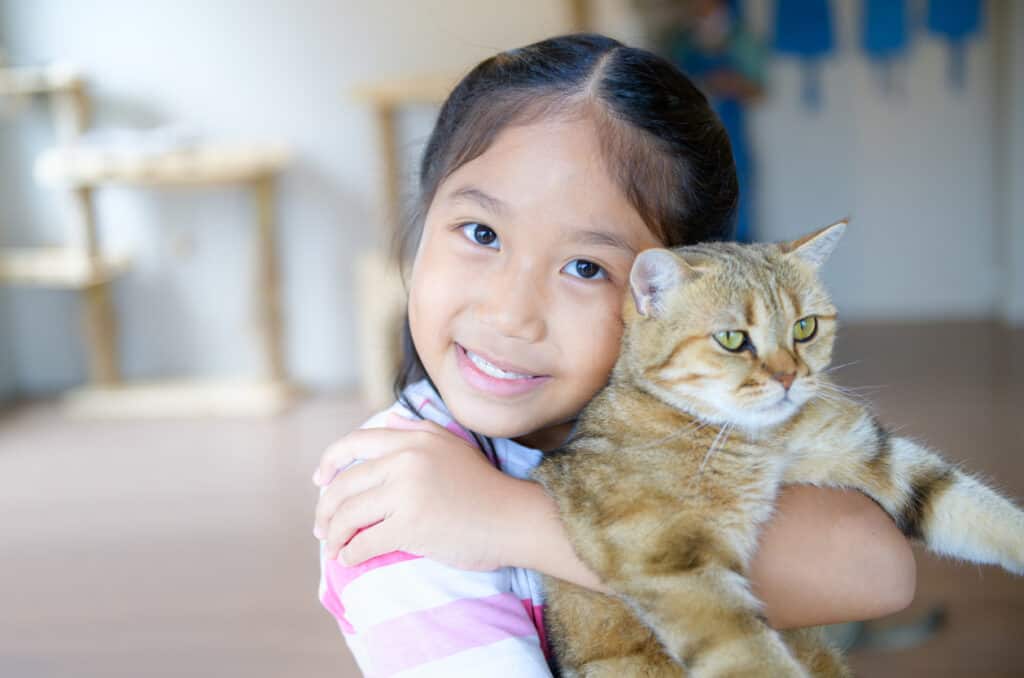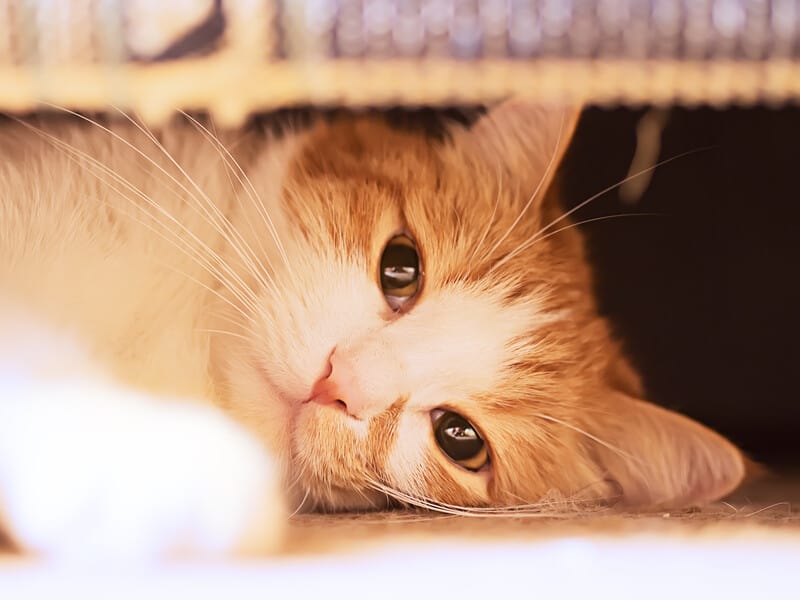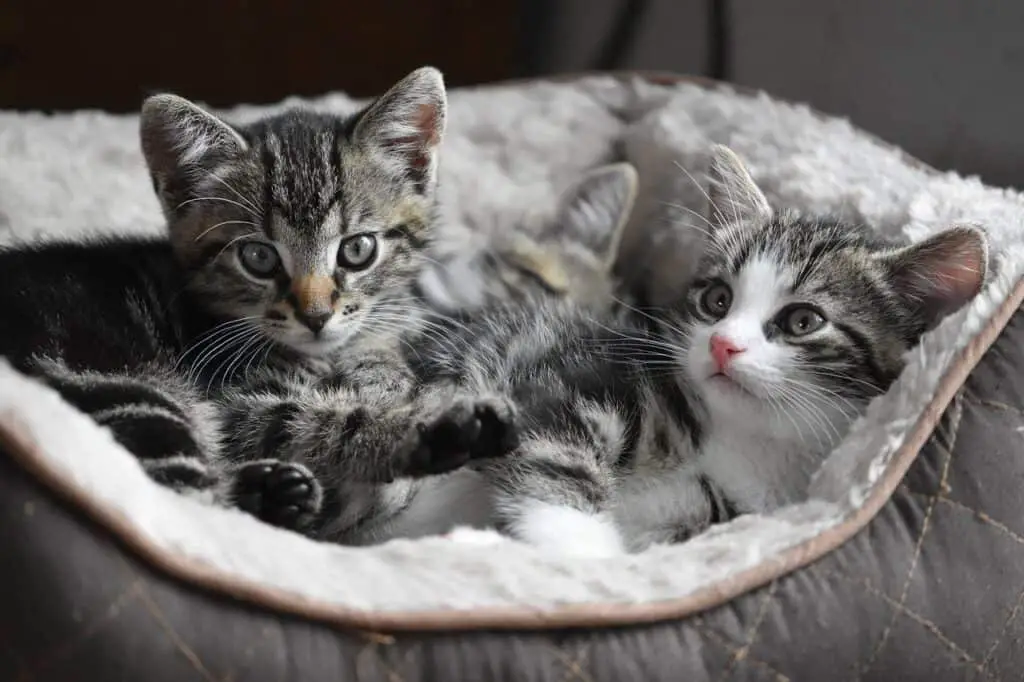As cat-parent, we ask ourselves, how long will my kitty stay with me in this life? How old can cats get? What is the average cat’s life expectancy?
When googling the question “how long do cats live”, you will not get a precise answer and are likely to get a range of between 8 and 20 years old.
This range seems plausible, but it would be good to have a more precise range to pinpoint the average life expectancy of your cat and what you can do to help your feline companion live as long as possible in good health.
So, I went to work and gathered everything I could find, scattered all over the internet, speaking with others and some expert advice (a couple of vets that help me care for my cat, Max).
How Long Do Cats Live? – Average Life Expectancy
The average life expectancy for cats is roughly between 8 and 20 years. However, this depends on several factors like their environment, gender, purebred or mixed breed, spayed or neutered, nutrition, and overall physical and mental health.
So basically, when talking about a cat’s life expectancy, there are several factors to consider. All of these can contribute to their maximum age positively or negatively.
Examples of these factors are:
- Breed, purebred or mixed breed?
- Diet
- Health
- Care
- Indoor versus outdoor
Suggested reading: 10 Ways To Make Your Cat Live Longer.
Cat Age Chart
We’ll dive into some of these factors in this article, but without further ado, the cat age chart shows the average life expectancy by breed.
Remember that these are still averages, with outliers in each direction.
The below table shows the average range of minimum and maximum ages for popular breeds.
| Breed | Average age range |
|---|---|
| American Bobtail | 13 -15 |
| American Curl | 12-16 |
| American Shorthair | 15-20 |
| American Wirehair | 10-16 |
| Balinese | 8-13 |
| Bengal | 9-15 |
| Birman | 13-15 |
| Bombay | 12-16 |
| British Shorthair | 15-20 |
| Burmese | 16-18 |
| Chartreux | 11-15 |
| Cornish Rex | 11-14 |
| Devon Rex | 9-15 |
| Egyptian Mau | 9-15 |
| European Burmese | 15-18 |
| Exotic Shorthair | 8-15 |
| Havana Brown | 15-20 |
| Himalayan | 9-15 |
| Japanese Bobtail | 9-16 |
| Javanese | 10-15 |
| Korat | 10-15 |
| LaPerm | 10-15 |
| Maine Coon | 9-15 |
| Manx | 14-16 |
| Norwegian Forest Cat | 14-16 |
| Ocicat | 15-18 |
| Oriental | 8-12 |
| Oriental Shorthair | 12-15 |
| Persian | 10-18 |
| Peterbald | 10-13 |
| Pixie-bob | 12-16 |
| Ragamuffin | 15-18 |
| Ragdoll | 12-15 |
| Russian Blue | 15-20 |
| Savannah | 12-20 |
| Scottish Fold | 11-14 |
| Selkirk Rex | 12-15 |
| Siamese | 11-15 |
| Siberian or Siberian Forest Cat | 10-18 |
| Singapura | 11-15 |
| Somali | 12-15 |
| Sphynx | 10-15 |
| Tonkinese | 12-16 |
| Toyger | 10-15 |
| Turkish Angora | 12-18 |
| Turkish Van | 12-18 |
Do mixed cat breeds live longer?
Generally, mixed-breed cats live longer than purebreds because mixed breeds come from a more diverse gene pool. This makes mixed breeds less susceptible to inherited health issues and reduces the risk of inbreeding.
How does this work?
To keep the breed pure, pedigree cats are often ‘inbred’. Due to the smaller gene pool, problems such as inherited diseases or other genetic abnormalities are more prevalent in purebred cats.
With mixed breeds, mother nature has much more opportunity to let natural selection run its course and (over time) build stronger bloodlines with the weaker genes filtered out due to evolution.
Suggested read: Do Cats Get More Affectionate With Age?
Indoor versus outdoor cats
Whether your cat is indoors or outdoors can impact its average life expectancy.
Generally, indoor cats have a better chance of reaching old age than outdoor cats. This is because outdoor cats are exposed to more dangers, such as getting into fights with other cats, being hit by traffic, or picking up diseases or infections.
To determine the risk for your cat, it’s best to look at your living environment.
For example, the risks are considerably less when living in a quiet neighborhood, away from heavy traffic, or when your cat usually stays in the garden.
On the other hand, the risks would be higher for city cats or those who like to keep a large territory.
Another thing to consider is that females usually stay closer to home than males.
Also, if you prefer to keep your cat indoors, ensure it gets enough opportunity to exercise because a low level of activity can cause obesity and even depression in cats. This is another risk to their health and, thus, their lifespan.
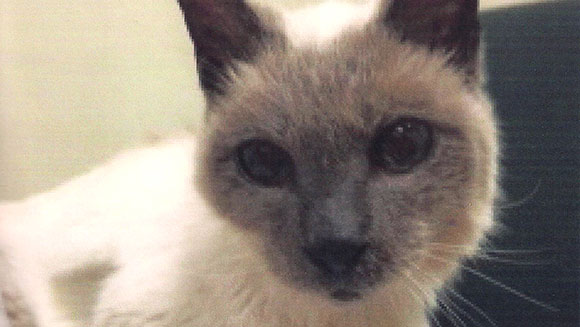
The right nutrition to keep healthy
Just like eating healthy keeps us humans, in good condition for longer, the same applies to your furry friend.
Ensuring your cat gets the proper nutrition, a varied menu and the right quantities almost ensures a long, happy, and carefree life.
Nutrition for cats can be a study in itself, and it’s more complex than I can cover in this article.
I’ll cover the essential recommendations below; however, if you’re interested in getting more information on cat nutrition, look here, here, or here.
So, without getting into the weeds on this topic, there are just three main things to keep in mind when feeding your cat a healthy diet:
- A varied menu
- High-quality food
- The correct quantity at the right time
A varied menu
No one likes to eat the same food every day. The same applies to your cat. However, apart from boring your cat with the same menu daily, it’s also not very healthy.
Different menus contain different nutrients, all of which your cat needs to stay healthy. So, regularly switch your feline’s menu. It will make your furball look forward to feeding time more and improve their health.
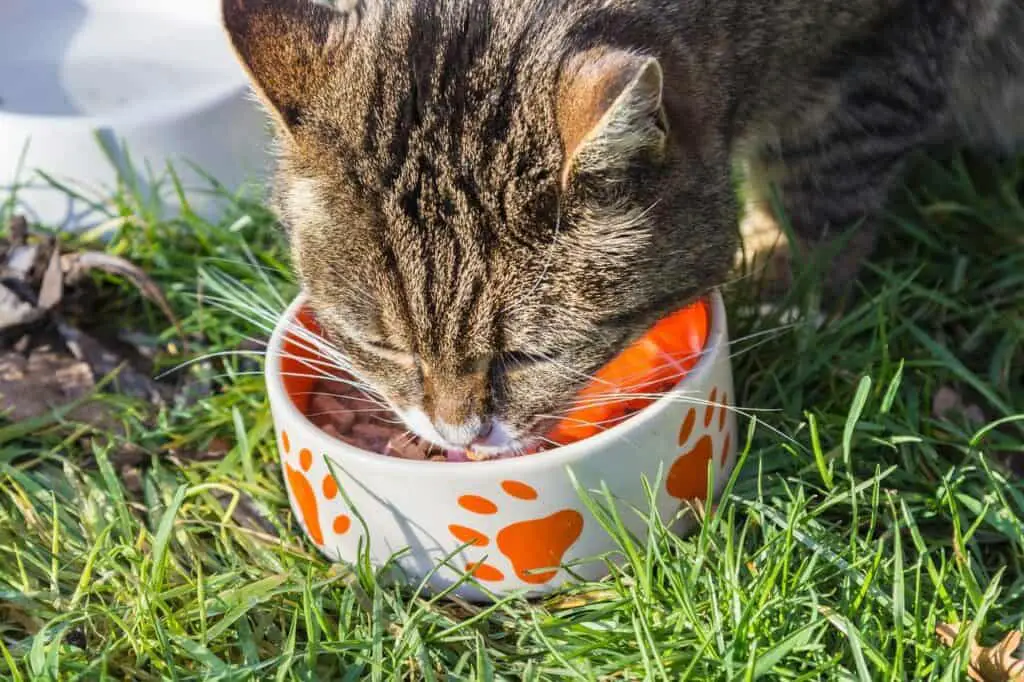
By variance, I don’t just mean trying a different taste of the same generic canned food brand. Although that’s an excellent start, try experimenting with other foods and see what your cat likes.
Some choices will be more successful than others, and all cats have different preferences.
Switch up your cat’s diet and try the following
- Different ‘tastes’, different brands
- Alternate canned food with fresh meat or fresh fish (check here for how to do this)
- Both wet and dry food benefit a cat’s health so feed both (explained in our article right here)
- Some cats like fruit and vegetables. You can experiment with this, but the main diet should consist of meat. (see what vegetables cats can eat and which ones to avoid here)
High-quality food is best for your cat
Like us, cats can eat “junk food” every once in a while, as long as their primary diet consists of (relatively) high-quality ingredients.
That generic brand in your local supermarket might be cheap, and your cat will eat it, but it will not benefit its health.
More high-quality brands such as Hills, Royal Canin, or Orijen will use better, fresher ingredients with balanced nutritional content and fewer potentially harmful additives.
If you decide not to go for an A-brand, stay away from the cheapest brands. In that case, go for a mid-range brand such as Friskies, Whiskas, or Purina.
Yes, better quality cat food will be more expensive, but your cat will love you for it, and it will save you veterinary costs in the long run when your cat stays healthy for longer.
The right quantity at the right time
It’s very easy for cats to over-eat, and because of this, cat obesity is a huge problem.
In the wild, especially when looking at big cats, felines depend on the hunt and can easily go days between meals. Because of this, some cats will still instinctively eat as much as they can in a single sitting, even when fed regularly.
The ideal feeding schedule for cats is to eat relatively small amounts of food throughout the day.
This would also mimic their hunting behavior, where they might eat a few smaller prey during the day.
Cats who are obese can develop a range of health issues like problems with their joints or diseases like diabetes which is nowadays very common in cats, challenging to treat, and will undoubtedly lead to a quick and painful death.
Even without those issues, obese cats are often less active, which, in turn, can cause mental health issues.
Don’t overfeed your cat; spread their meals across the day as much as possible. This can be done with things like puzzle feeders or timer feeders (sponsored links to Amazon).
In general, stick to the reference below for your cat’s calorie intake. Not sure what’s best for your cat? Consult your vet and get advice for your cat’s specific situation.
| Daily recommended calorie intake for cats | 5 lbs | 10 lbs | 15 lbs | 20 lbs |
|---|---|---|---|---|
| Kitten | 200 kcal | 400 kcal | 600 kcal | 800 kcal |
| Lean Cat | 170 kcal | 280 kcal | 360 kcal | 440 kcal |
| Overweight Cat | 180 kcal | 240 kcal | 280 kcal | 310 kcal |
| Pregnant Cat | 336 kcal | 603 kcal | 850 kcal | 1090 kcal |
Have a challenge getting your cat to eat enough? See our article here to find out why your cat might not finish its bowl.
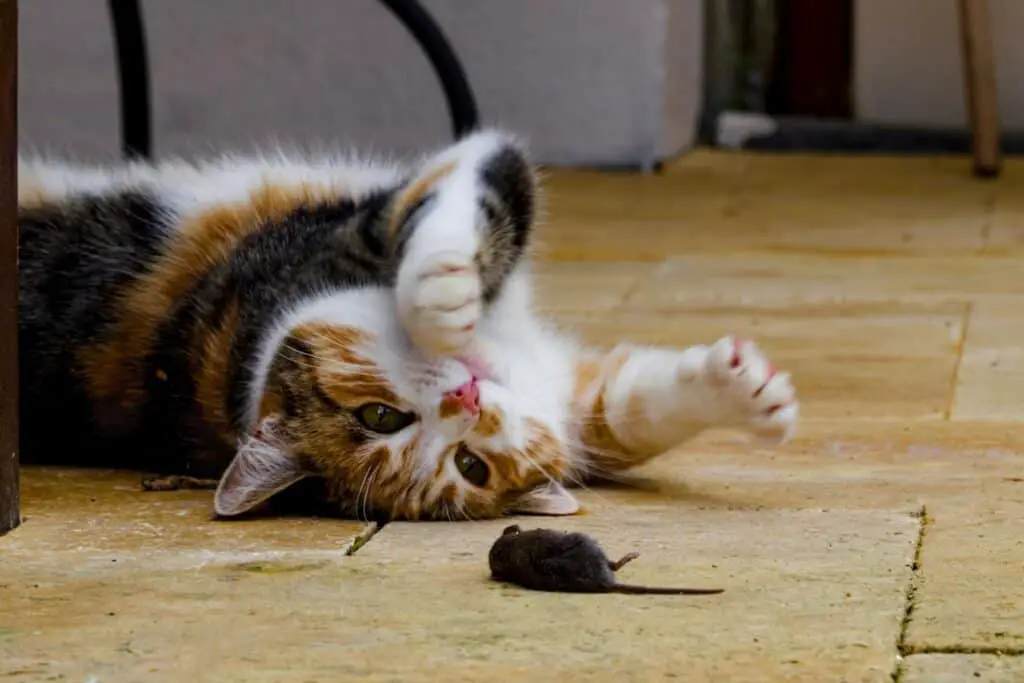
Exercise and playtime!
Knowing how lazy our cats can be, sometimes it is hard to imagine that they actually enjoy being active as well. I’d even say it is essential for their health.
In the wild, cats are very active as they need to hunt for their food daily and usually eat a few smaller prey per day. As a result, cats evolved for this. They are lean, fast, and strong.
As our pets, cats have become a bit spoiled and are not as active as they should be, which sometimes has a detrimental effect on their health.
To keep your cat in top physical condition, she should get some exercise every day. Outdoor cats get this automatically, but for indoor cats, a bit of persuasion is sometimes needed.
One of a cat’s favorite things to do is to spend time playing with you. Playing with your cat for about an hour each day does wonders for its physical and mental health.
Need some inspiration? Have a look at this overview at Amazon for some great ideas.
Final thoughts and tips
As loving cat parents, we want our cat-children to stay with us as long as possible. It goes without saying that we want them to spend their years in good health.
Keeping a cat healthy and ensuring a long and happy life is not rocket science. Generally, what is healthy for us, is healthy for our pets. Apart from a nutritious diet, enough exercise, and basic safety, make sure to go for regular checkups at your vet.
For kittens, schedule a checkup every 6 months. For adults and seniors, at least once a year or when needed.
Most health issues can be treated successfully. Mainly when found at an early stage, these treatments usually don’t break the bank. Also, ensure your cat receives all required vaccinations to avoid unnecessary costs and worries.
You might wonder, does my cat’s character change as it grows older? Have a read through our post titled “Do Cats Get More Affectionate With Age?”
Love Cats?
Then you will enjoy our other content as well. Have a look at these popular posts on our website
-
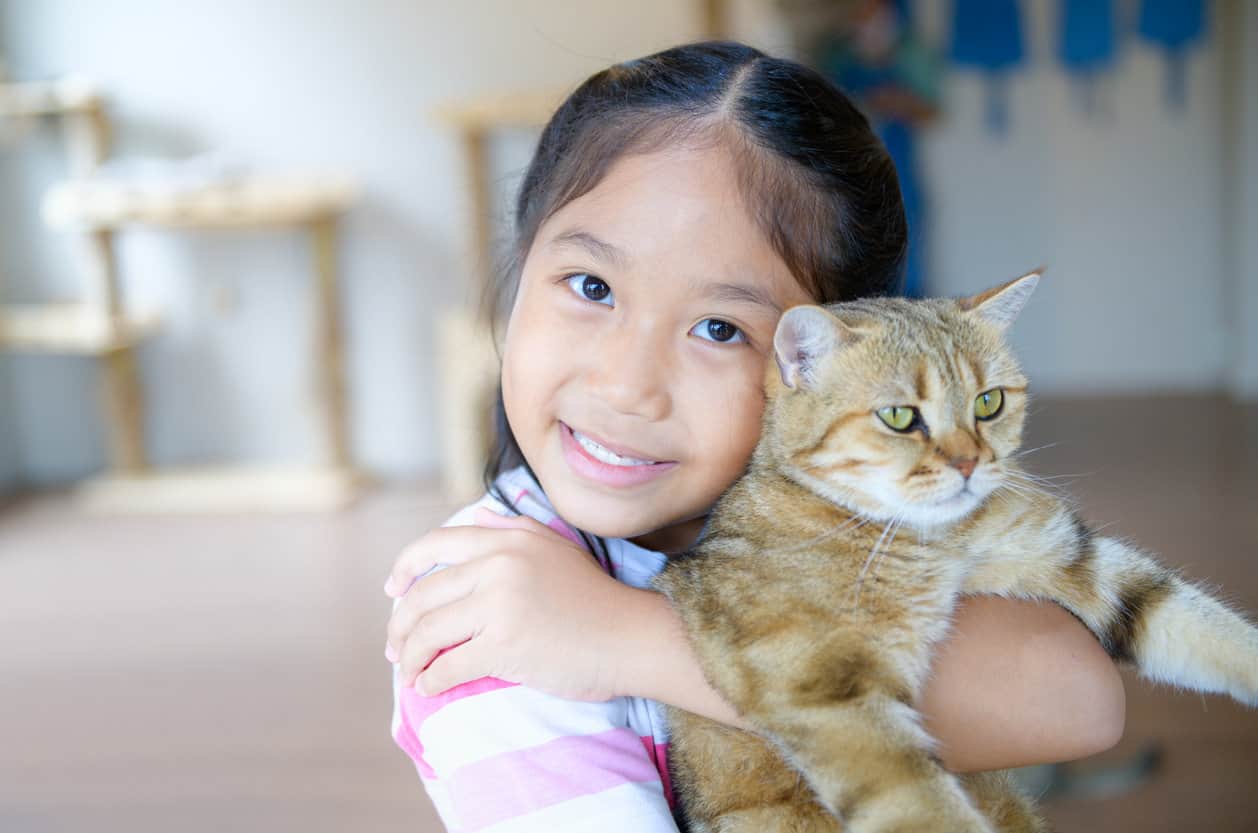
10 Ways to Make Your Cat Live Longer
The oldest cat to ever live passed away at the old age of 38. On average, household cats live between […]
-
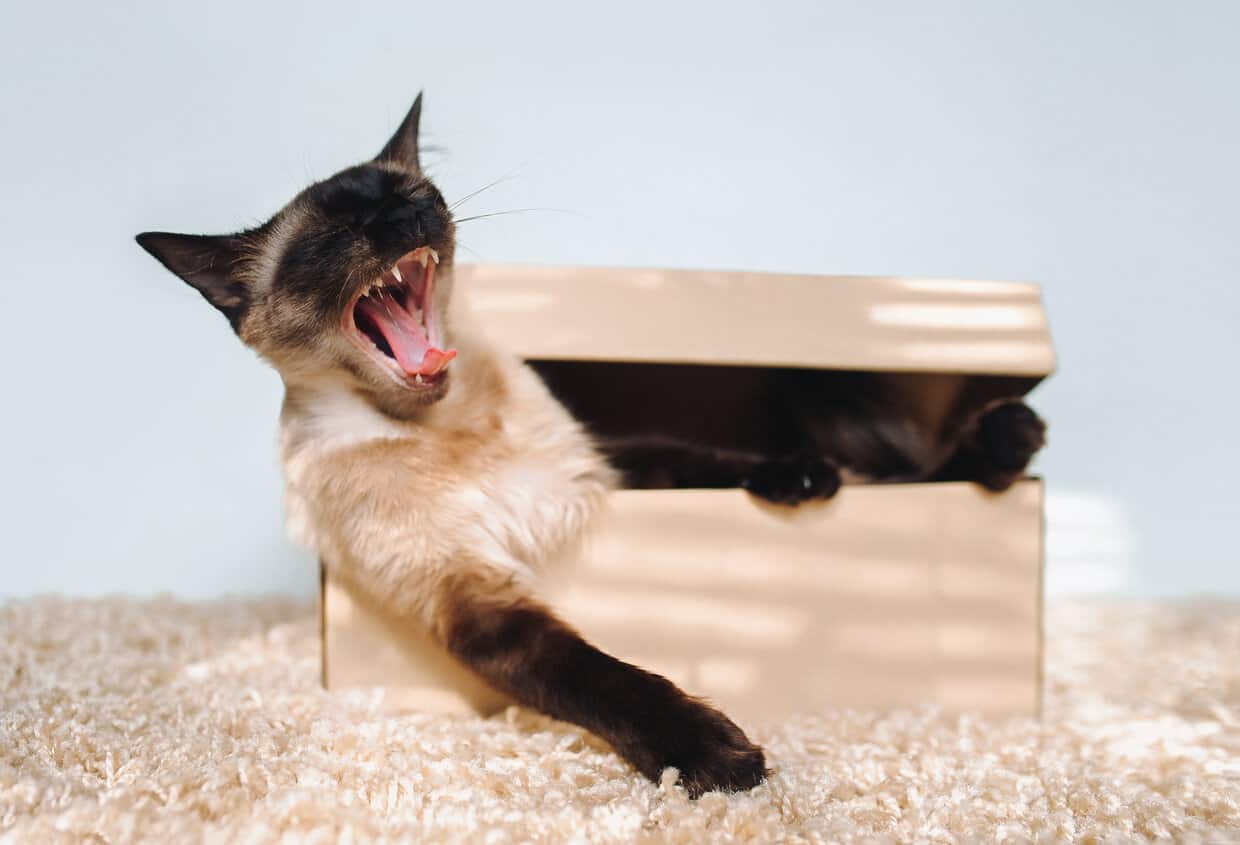
12 Reasons Why Siamese Cats Cry at Night
Siamese cats are a popular breed of cats that many people choose to have as pets. Perhaps you have heard […]
-
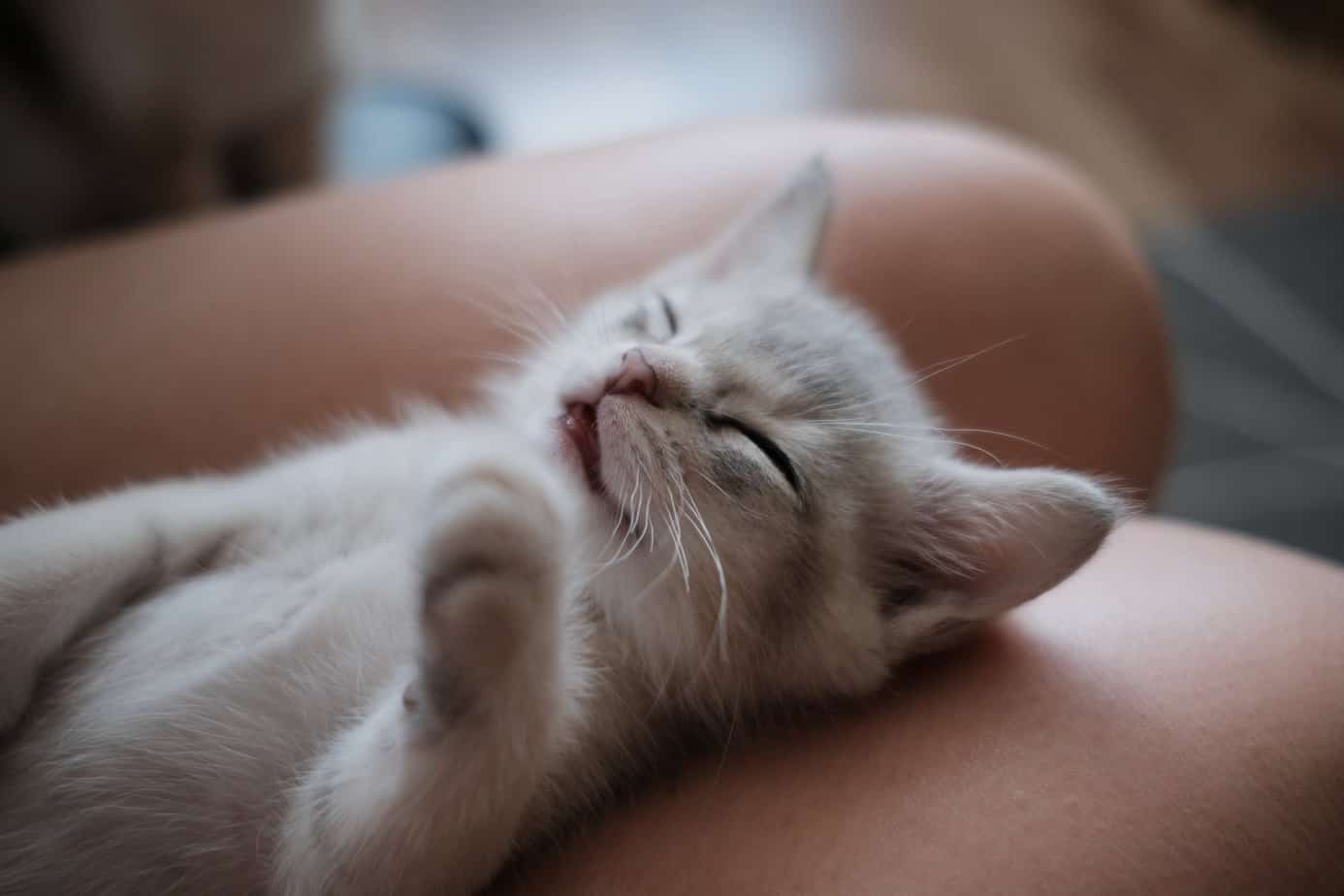
15 Incredible Ways That Cats Show Affection For Humans
Wondering how cats show their affection for humans? We have listed several incredible ways that cats are trying to show their love for us.

